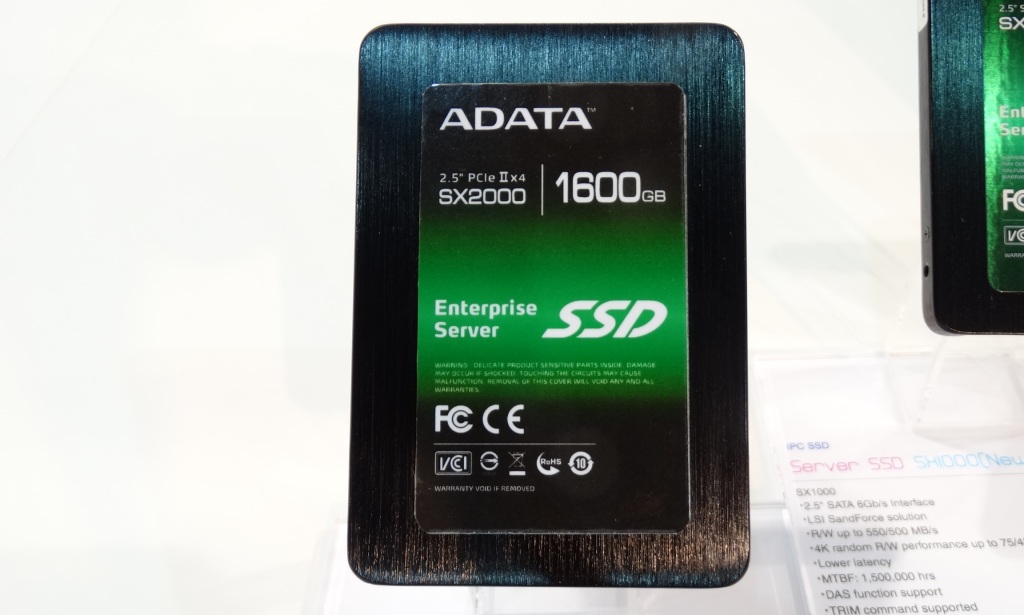As much as we would like to say that we wouldn’t have believed it if we hadn’t seen it, the truth is that this is one of those finds that has to be seen in operation first hand before anyone will believe it…but it was right there before our eyes.
Today at Computex 2013 in Taipei, Taiwan, ADATA introduced their new line of enterprise SSDs. One SSD in particular, the ADATA SX2000, caught our eye right off. The sticker on the SX2000 depicts a capacity of 1600GB and, unlike just about every other notebook form factor SSD on the planet, the SX2000 has a PCIe 2.0 x4 interface rather than SATA. This SSD is the size of any typical drive you might see in a notebook.
The interface chosen for the SX2000 is the SFF-8639 which is a new 12Gbps interface and might be able to push speeds up to…1800MB/s read and write transfer performance. ADATA’s choice of this interface is rather interesting as ADATA specs for this SSD are 1.8GB/s read and write transfer speeds with up to 200,000 read IOPS, this from a regular notebook size SSD!
Our conversation with ADATA added a bit of mystery to the visit as they confirmed that the controller is a LSI controller and, although SF-3000 was mentioned once or twice, we were told that a final name convention has not been set and the flash storage processor is known by the name of ‘Griffin’. Is this what we are about to see from LSI SandForce in the near future? Is 1.8GB/s and 200K IOPS from an notebook sized SSD possible?
In looking at the new SX2000, we thought it a bit odd that the 4K read IOPS are listed at 200,000, where traditionally, LSI SandForce excelled in low 4K write IOPS. The SX2000 does not list that it is LSI SandForce Driven and the IOPS aren’t the norm for LSI SandForce flash storage processors. And then we checked out the SX1000 and SX1000L configurations, also new ADATA enterprise entries. If you look at the specifications of both, the two thngs that seem to stand out are that they are indeed LSI SandForce solutions and. unlike all other previously, the 4k write IOPS are lower than the 4k read IOPS, similar to the SX2000.

 So the question at the end of the day is whether ADATA inadvertently introduced the next gen LSI SSD offering that many have been wondering about for some time now. Can we see speeds of 1.8GB/s reaching computer systems anytime in the near future? This is an enterprise SSD and its interface speaks to a server solution but we definitely have to wonder why we are seeing this in a 2.5″ notebook form factor. Better yet, why would a server SSD have need for Microsofts new DEVSLP which is part and parcel to the new Haswell chipset where new PC systems can continuously update themselves while in a very low power sleep.
So the question at the end of the day is whether ADATA inadvertently introduced the next gen LSI SSD offering that many have been wondering about for some time now. Can we see speeds of 1.8GB/s reaching computer systems anytime in the near future? This is an enterprise SSD and its interface speaks to a server solution but we definitely have to wonder why we are seeing this in a 2.5″ notebook form factor. Better yet, why would a server SSD have need for Microsofts new DEVSLP which is part and parcel to the new Haswell chipset where new PC systems can continuously update themselves while in a very low power sleep.
One last thought as well when considering the IOPS of this drive… Is it possible that this new solution may NOT be using drive compression as we have seen from all previous SF SSDs? The low write IOPS just may allude to that.
We did approach LSI representatives immediately after discovering this story. As expected, they would not confirm any of the information and would not comment on the above pictures. We have to admit that it is even possible that there is a mistake in the specifications of the SX2000 that nobody picked up. We just found it odd that, when we suggested that there was a mistake in the specifications, nobody would confirm that the mistake was made nor did they want to change what was right there before our eyes.
 The SSD Review The Worlds Dedicated SSD Education and Review Resource |
The SSD Review The Worlds Dedicated SSD Education and Review Resource | 

Sounds like you may have caught them in a “conundrum”. They may end up revealing details sooner than they had anticipated, lol!
Simon
Well, there is definitely a “mistake” there. The maths at least simply don’t add up on throughput.
A 12Gbps channel has, at theoretical maximum (ie, ignoring overhead), a throughput of 1536MBps (or 1.5GBps). That’s a heck of a lot slower than the described 1800MBps, let alone 1.8GBps!
The interface being 12Gbps comes from its documentation found on the internet. Actually, Anand did a iece on it as well late last year as I remember. We make no clais as to the specs but to say that the listed specs were 1800MB/s which is 1.8GB/s. Mistake? We have spent two days trying to gain information as to validity or error for two days; nobody will credit such as a mistake and the product is still on display as of about an hour ago.
12Gbps = 1.4648GB/s
You almost have to suspect there’s some kind of compression going on between the SSD and a special ‘driver’ on the computer. This would pump up the ‘effective’ speed but not the physical.
Cannot answer that but I am looking the other way and wondering if the new controller will even be using compression as per the SF norm. Other things also come into play such as controller heat issues and whether the system can keep up eheh.
price?